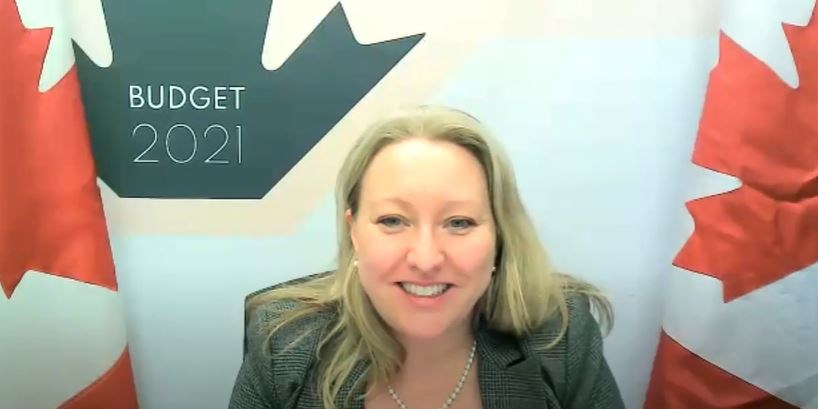Funding for child care, tourism and anti-Asian racism are just some of the items included in the federal government’s new budget – all of which will benefit the Richmond community, according to Canada’s associate minister of finance.
Mona Fortier said one of the “flagship” investments in Budget 2021, the first federal budget in two years, is in early learning and childcare.
Ottawa is proposing to invest $30 billion to cut daycare fees in half by next year, and reach $10-a-day fees by 2026.
A report published earlier this year by the Canadian Centre for Policy Alternatives found ranked Richmond as the third most expensive city in Canada for parents with toddlers in care, costing them a median monthly fee of $1,300.
“A family needs to pay $1,300 per month for one child in Richmond right now, so imagine cutting that cost by half by next year. It’s going to be quite the game-changer for many families,” Fortier told the Richmond News on Friday, after kicking off her virtual tour of B.C. following the unveiling of the budget earlier in the week, with Zoom meetings with the Richmond Chamber of Commerce and Richmond-based business Association ICONNBC.
“Our objective is to make a more accessible, affordable and high-quality daycare system. And of course, that means we need to provide more spaces to make sure that’s possible.”
The investments in childcare will also help to create 240,000 jobs.
But importantly, said Fortier, investing in childcare will help women get back into the workforce.
“The hardest hit groups (during COVID-19) were women, youth, low-wage workers, racialized and Indigenous peoples,” she said. “We lost 60,000 women from the workforce, compared to 91,000 men coming back to the workforce.”
During the chamber’s virtual post-budget forum with Fortier, supports for families, businesses and tourism, as well as infrastructure and anti-racism and inclusivity, were among the topics discussed.
Funding for tourism, aviation
To help revitalize the tourism sector, the federal government is promising $1 billion over three years.
“We know tourism has been hit hard by the pandemic – and I know Richmond especially, the impacts have been significant, and reductions in flights have compounded those impacts.”
The funding includes, for example, a $500 million tourism relief fund to help businesses adapt to public health measures and help them grow and recover after the pandemic, she said. Meanwhile, $200 million will go towards community festivals and events and $100 million is promised for marketing campaigns.
For Nancy Small, CEO of Tourism Richmond, the funding is welcome news, however, Richmond will “benefit the most when borders reopen.”
“So when the conditions allow borders to reopen, and we can get our American market back and our international market – especially Asia and to a certain extent Europe – that’s when it will directly and positively impact,” she said.
When borders do reopen, though, the funding promised in the budget will be much-needed, for example, by events’ organizers, Small added.
“This funding is incredible – I’m just not sure if it’s going to be enough for the whole country,” Small said. “But for events, in the post-pandemic world and as we look to next spring and summer, it will be so important for us to get some legs back under us.”
She added that it was also good to see the extension of supports such as the Canada Emergency Wage Subsidy – which Small said has been “extremely successful” – and Canada Emergency Rent Subsidy until September.
“We were very happy and very heartened to see (those extensions), from an industry perspective.”
There’s also funding for airports, said Fortier – pointing to the sharp decline in air travel seen at YVR – such as $82.5 million to support major Canadian airports, including investments in COVID-19 rapid testing.
Funding towards anti-racism initiatives
Ottawa is promising $11 million over two years to expand initiatives to support Asian Canadian communities, and create a fund to support “all racialized communities directly impacted by increasing acts of racism during the pandemic,” said Fortier.
$2 million in funding will be distributed to not-for-profit organizations, such as places of worship, schools and community cultural centres, to boost security infrastructure to help protect communities at risk of hate-motivated crimes.
Fortier said the government will work to increase more opportunities “for a fairer and inclusive public service.” Meanwhile, the Black entrepreneurship fund will be increased, and the government will create an endowment for Black communities and Black-owned businesses.
Funding towards housing
Fortier said $2.5 billion will be invested, and another $1.3 billion in existing funding redirected, to help build, repair or support 35,000 housing units.
This includes funding that will go towards adding at least 4,500 new affordable housing units across the country.
“So the Richmond community could apply with a specific project to be able to provide some affordable units,” Fortier said.
She said housing needs to be made more affordable and plentiful, given the “constraints” on the housing industry caused by COVID-19, as well as a surge in housing prices seen in the wake of low interest rates.
The government also plans to introduce a national, annual one-per-cent tax on the value of non-resident, non-Canadian owned homes, effective January 1, 2022.


